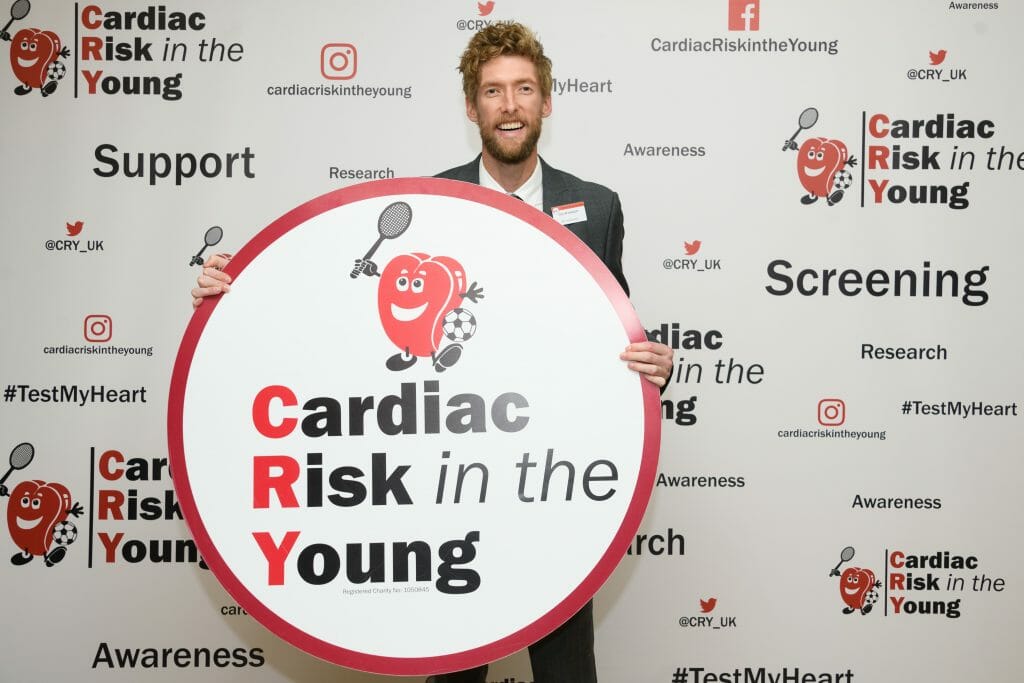The last thing on Calum Haggett’s mind was a potential heart problem, let alone open heart surgery. As a young, fit athlete who had just been selected to play for England in the Under-19 Cricket World Cup in New Zealand, he made the assumption that most young people do – I feel healthy, so why question it? Then, thanks to a routine heart screening completed by CRY, Calum, now 28, was found to have aortic root dilation and a leaking heart valve.

CRY Parliamentary Reception 2018
Shock was Calum’s first reaction. “I definitely wasn’t expecting anything like that,” he said when recalling his diagnosis. “I can remember thinking, ‘can they actually do anything?’ Because I had no idea what was wrong really.”
80% of young sudden cardiac deaths occur with no prior symptoms. In most cases, the only way for young people – from professional cricketers, to grassroots-level footballers, to any young member of the public – to find out what’s wrong is through screening. A common lack of symptoms and people simply not realising the potential risk means that many conditions tragically go unnoticed.
“I didn’t really know what would happen,” Calum said when discussing his diagnosis. “I guess at that time I didn’t really worry if I couldn’t play cricket again as long as I was healthy. That was the big thing for me. Then as soon as I found out that once the surgery had gone well I’d be good to go, then I was pretty happy to get back going again.”
Thankfully for Calum, he was able to return to cricket a few months after corrective surgery. “It was a pretty easy process considering it was quite a major operation. I spent a month not doing very much afterwards and then spent about three months just sort of ticking along, getting my base fitness level up, which was quite hard to start with.”
Of course, professional athletes are in a different situation to the general population, requiring them to participate in consistent high-level training. But once a diagnosis is made, there are various ways to ensure a safe, healthy life moving forward. CRY screened 29,045 young people in the 2018, and at least 280 will have received treatment, lifestyle advice or surgery having been diagnosed.
“I’ve definitely been one of those people that would have said, ‘I’m healthy, why do I need to get checked?’” Calum said when discussing how his diagnosis and surgery impacted his teammates. “That would have been my view beforehand. I’m sure that would have been the case with a lot of other players. I was with Somerset and now with Kent for quite a number of years, and I guess when they see it first-hand that it can save lives it does open their eyes. It’s happened twice in our team with Ivan Thomas having an irregular heartbeat. He had to have an operation on his heart and it just brings it home again.”
If there’s one positive to take away from situations like these, it’s that vital awareness can be raised. Due to cases like his own and that of former England cricketer James Taylor – who was forced to retire at just 26 years old after he was found to have arrhythmogenic right ventricular cardiomyopathy (ARVC) – Calum feels that awareness in the cricketing world is starting to increase.
“The James Taylor [diagnosis], because he was playing for England at the time, having someone like him – I mean, it’s tragic what happened – it’s now raised a little bit of awareness,” Calum said. “And I think players are definitely more aware of it, and hopefully kids and parents will be. Because someone like him was at the top, and for it to happen to him means it can happen to anyone.”
When asked what he hopes to achieve through his role as a CRY Ambassador, Calum said: “Definitely raising awareness and getting rid of that ignorance of, ‘I’m healthy, so I won’t get checked.’ Because I know that I would be in that boat if I hadn’t have had it or seen it first-hand… I know there’s a lot of work that needs to be done.”
CRY is so thankful to have Calum’s support. There can often be a misconception that heart problems only occur later in life, but that simply isn’t true. We need to continue increasing awareness, and work to gain the support of policymakers and MPs who can help make a difference.
With the help of our new CRY Ambassadors, such as Jade and Calum, we can continue to raise awareness of how vital screening is, reaching fans of their respective sports (football and cricket) who might not otherwise know about young sudden cardiac death.



